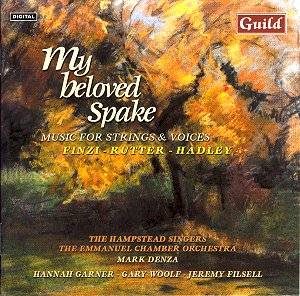MY BELOVED SPAKE - Music for Strings and Voices
Gerald FINZI - God is gone up;
Magnificat
John RUTTER - Musica Dei donum; Lord,
make me an instrument of they peace;
A Choral Amen; O be joyful in the Lord; O how amiable are thy dwellings;
The Lord bless you and keep you
Patrick HADLEY - My beloved
spake
George DYSON - Hierusalem
Frank BRIDGE - A Prayer
Gustav HOLST - Ave Maria
 Soloists, The Hampstead Singers,
The Emmanuel Chamber Orchestra
Soloists, The Hampstead Singers,
The Emmanuel Chamber Orchestra
conducted by Mark Denza
 GUILD GMCD 7200
[77:25]
GUILD GMCD 7200
[77:25]
AmazonUK
AmazonUS

Recorded at Emmanuel Church, West Hampstead in February 2000, this is the
first commercial release from Mark Denza and his Hampstead Singers. There
are a number of aspects of the production of this disc which tend to point
to an inexperienced hand at the tiller - an innocent over-enthusiasm to claim
'premiere recording' when the works concerned are merely a slightly
different version than previously recorded (O how amiable) or extremely
short (A Choral Amen) and 'premiere recording of this
arrangement' where existing versions have been specially arranged or
amalgamated to suit the specific forces available for this recording. The
album cover announces 'Music for Strings and Voices' but the organ plays
a considerable role as does flute and piccolo. Three composers are listed
here, Finzi, Rutter and
Hadley (who, probably not coincidentally,
are the composers of tracks 1, 2 and 3), but in fact the longest and most
significant works on the disc are undoubtedly by Dyson and
Bridge who are kept to a secondary
reference on the back.
Negatives noted, there is much to enjoy on this CD. Jeremy Filsell (far from
new to records) is an excellent organist and the choir sings the opening
Finzi 'God is gone up' with verve and good intonation. Of the
12 tracks on offer, no less than 6 are John Rutter compositions.
Musica Dei donum is well known from its inclusion in 'A Garland
for Linda' and Gary Woolf's excellent flute playing, commenting above
the sung Latin text, is very well balanced. Patrick Hadley's well
known 'My beloved spake' also features flute in pastoral vein and
it is a shame that the sour tone of the oboe (played by one of the choir's
altos) rather takes one aback.
Rutter's 'Lord, make me an instrument of thy peace' includes one of
his drop dead gorgeous melodies which ends up by sounding as if it came straight
out of a Broadway musical. None the worse for that at all; indeed very suitable,
as it was composed for the Texas Choral Directors' Association. Although
Mark Denza tells a good story in the booklet notes about how Rutter's publisher
came to find out that the 'Choral Amen' was not by an unknown composer
but by Rutter himself in pastiche mode, the work remains unsubstantial and
far too similar to many specially composed incidental pieces for entrance
and exit moments in the Anglican service from the nineteenth century.
Dyson's 'Hierusalem' is a major work and at nearly sixteen minutes
it satisfies the ear craving for greater contrast within a single piece.
Composed for solo soprano, harp, organ, strings and chorus it has both
considerable shape and several contrasting passages, all within the pastoral
idiom. Hannah Garner's rather small and sharp voice is not ideal but she
copes very well with the difficult challenges Dyson sets for her until, perhaps,
the very last high climax in the final verse slightly unsettles her.
Frank Bridge's 'A Prayer' is the longest work on this CD at
over 18 minutes. Strings, organ and chorus together provide, also, the best
performance here. Bridge was only able to sanction a first performance in
1919 after the Armistice - the war had affected him deeply and the Thomas
à Kempis text on the subject of peace was clearly of great significance.
At 17:17 occurs a most unusually chromatic passage, at least for the Bridge
of this period, to the words 'and for Thy sake love to be despised' - a sign
of the bitter feeling that the combat had built up in him. A work well worth
getting to know.
The remaining Rutter pieces include the crowd-pleasing 'O be
joyful' (Jubilate), well sung here, 'O how amiable', very melodious (and
more suited for the solo soprano) and 'The Lord bless you and keep you' written
for the funeral of a favourite teacher and friend, full of tender and
heart-warming melody.
Finally Holst's early eight-voice
Ave Maria, arranged here by the conductor for full chorus, proves
to be the most technically difficult challenge the young choir has to face.
Denza himself, therefore, has set the standard for his singers and it has
to be said that they struggle in places. But the performance of
Finzi's Magnificat with its moving final 'Amen' again points
to its composer as holding an eminent position among the 'pastoralists' featured
on this CD and equally to Denza's valuable and enthusiastic dedication to
British composition from, perhaps, its Golden Age.
Simon Foster

